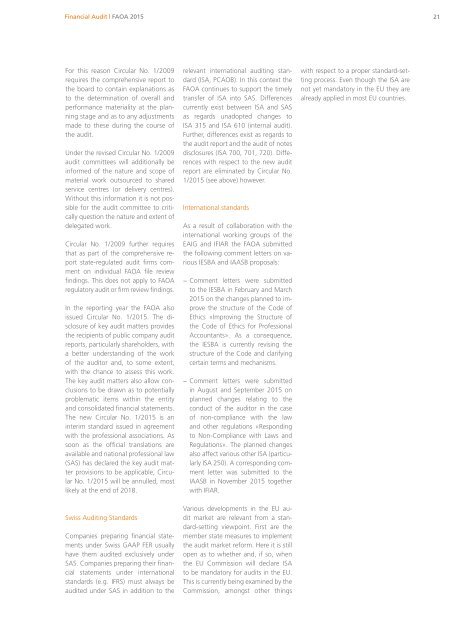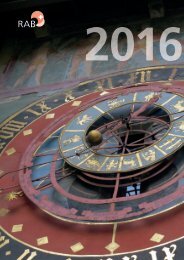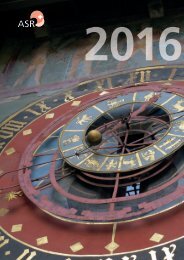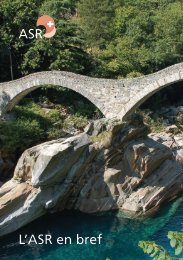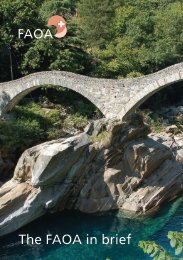Activity Report 2015
Activity Report 2015 - Federal Audit Oversight Authority FAOA
Activity Report 2015 - Federal Audit Oversight Authority FAOA
You also want an ePaper? Increase the reach of your titles
YUMPU automatically turns print PDFs into web optimized ePapers that Google loves.
Financial Audit | FAOA <strong>2015</strong><br />
21<br />
For this reason Circular No. 1/2009<br />
requires the comprehensive report to<br />
the board to contain explanations as<br />
to the determination of overall and<br />
performance materiality at the planning<br />
stage and as to any adjustments<br />
made to these during the course of<br />
the audit.<br />
Under the revised Circular No. 1/2009<br />
audit committees will additionally be<br />
informed of the nature and scope of<br />
material work outsourced to shared<br />
service centres (or delivery centres).<br />
Without this information it is not possible<br />
for the audit committee to critically<br />
question the nature and extent of<br />
delegated work.<br />
Circular No. 1/2009 further requires<br />
that as part of the comprehensive report<br />
state-regulated audit firms comment<br />
on individual FAOA file review<br />
findings. This does not apply to FAOA<br />
regulatory audit or firm review findings.<br />
In the reporting year the FAOA also<br />
issued Circular No. 1/<strong>2015</strong>. The disclosure<br />
of key audit matters provides<br />
the recipients of public company audit<br />
reports, particularly shareholders, with<br />
a better understanding of the work<br />
of the auditor and, to some extent,<br />
with the chance to assess this work.<br />
The key audit matters also allow conclusions<br />
to be drawn as to potentially<br />
problematic items within the entity<br />
and consolidated financial statements.<br />
The new Circular No. 1/<strong>2015</strong> is an<br />
interim standard issued in agreement<br />
with the professional associations. As<br />
soon as the official translations are<br />
available and national professional law<br />
(SAS) has declared the key audit matter<br />
provisions to be applicable, Circular<br />
No. 1/<strong>2015</strong> will be annulled, most<br />
likely at the end of 2018.<br />
Swiss Auditing Standards<br />
Companies preparing financial statements<br />
under Swiss GAAP FER usually<br />
have them audited exclusively under<br />
SAS. Companies preparing their financial<br />
statements under international<br />
standards (e.g. IFRS) must always be<br />
audited under SAS in addition to the<br />
relevant international auditing standard<br />
(ISA, PCAOB). In this context the<br />
FAOA continues to support the timely<br />
transfer of ISA into SAS. Differences<br />
currently exist between ISA and SAS<br />
as regards unadopted changes to<br />
ISA 315 and ISA 610 (internal audit).<br />
Further, differences exist as regards to<br />
the audit report and the audit of notes<br />
disclosures (ISA 700, 701, 720). Differences<br />
with respect to the new audit<br />
report are eliminated by Circular No.<br />
1/<strong>2015</strong> (see above) however.<br />
International standards<br />
As a result of collaboration with the<br />
international working groups of the<br />
EAIG and IFIAR the FAOA submitted<br />
the following comment letters on various<br />
IESBA and IAASB proposals:<br />
− Comment letters were submitted<br />
to the IESBA in February and March<br />
<strong>2015</strong> on the changes planned to improve<br />
the structure of the Code of<br />
Ethics «Improving the Structure of<br />
the Code of Ethics for Professional<br />
Accountants». As a consequence,<br />
the IESBA is currently revising the<br />
structure of the Code and clarifying<br />
certain terms and mechanisms.<br />
− Comment letters were submitted<br />
in August and September <strong>2015</strong> on<br />
planned changes relating to the<br />
conduct of the auditor in the case<br />
of non-compliance with the law<br />
and other regulations «Responding<br />
to Non-Compliance with Laws and<br />
Regulations». The planned changes<br />
also affect various other ISA (particularly<br />
ISA 250). A corresponding comment<br />
letter was submitted to the<br />
IAASB in November <strong>2015</strong> together<br />
with IFIAR.<br />
Various developments in the EU audit<br />
market are relevant from a standard-setting<br />
viewpoint. First are the<br />
member state measures to implement<br />
the audit market reform. Here it is still<br />
open as to whether and, if so, when<br />
the EU Commission will declare ISA<br />
to be mandatory for audits in the EU.<br />
This is currently being examined by the<br />
Commission, amongst other things<br />
with respect to a proper standard-setting<br />
process. Even though the ISA are<br />
not yet mandatory in the EU they are<br />
already applied in most EU countries.


